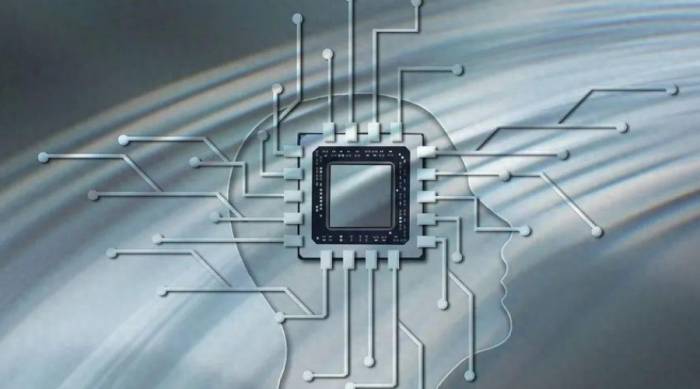China has tested a brain-computer interface on a monkey, enabling it to control a robotic arm with just its thoughts.
On Thursday, a Chinese company unveiled a brain chip similar to the technology developed by Elon Musk's neurotechnology startup, Neuralink.
According to Xinhua News Agency, a company named Beijing Core Intelligence Neurotechnology has developed a brain-computer interface (BCI) implant that allows a monkey to control a robotic arm and grab a strawberry using only its thoughts.
The report states that the "core brain chip," known as "Neucyber," is "independently developed by Chinese scientists" and is China's first "high-performance invasive brain-computer interface."
The Global Times reports that Neucyber consists of three core components—a high-throughput flexible microelectrode, two high-speed neural signal acquisition devices, and a neural decoding algorithm generator, all of which were developed in China.
It is said that this high-speed chip has low power consumption and its computational capability for intelligent visual target detection is 3000 times that of current high-performance commercial chips.
Xinhua News Agency cites the Chinese Institute of Brain Research (CIBR) as a co-developer of the NeuCyber system.
Advertisement
Furthermore, according to data from the business database Qichacha, the controlling shareholder of Core Intelligence Neurotechnology is the state-owned assets supervision and administration bureau of the Beijing municipal government.Xin Zhida's brain chip was showcased at the annual technology-themed Zhongguancun Forum in Beijing, where this year's focus also included semiconductors, artificial intelligence, green technology, and quantum computing. Although neither scientists nor Xinhua News Agency mentioned Elon Musk's brain chip startup, the unveiling highlighted China's goal of catching up with Neuralink.
Previously, China's Ministry of Industry and Information Technology listed brain-computer interface technology as an important "frontier emerging technology" at last year's Zhongguancun Forum.
Neuralink has already implanted its brain chips in humans, while China has not yet begun human trials.
Scientists question Neuralink's human trials for brain chips
According to a tweet posted by Elon Musk on January 29, he hopes to revolutionize brain-computer interfaces (BCI) through his company Neuralink. Recently, the company has implanted its "mind-reading" device into a human for the first time.
Brain-computer interfaces record and decode brain activity with the aim of allowing severely paralyzed individuals to control computers, robotic arms, wheelchairs, or other devices solely through their thoughts. In addition to Neuralink, other devices are also under development, and some have already been tested on humans.
Neuroscience researchers are cautiously excited about Neuralink's human trials, "What I would like to see is that they can prove it is safe. It can effectively measure brain signals—short-term, but most importantly, long-term," said Mariska Vansteensel, a neuroscientist at the University Medical Center Utrecht in the Netherlands and president of the International BCI Society.
However, the lack of detailed information has been frustrating. Apart from Musk's tweet, there has been no confirmation that the trial has begun. The main source of public information about the trial is the research brochure inviting people to participate. Tim Denison, a neuroengineer at the University of Oxford in the UK, expressed that the lack of details, such as the implantation site and the exact outcomes the trial will assess, is concerning.The trial was not registered on ClinicalTrials.gov, an online repository managed by the National Institutes of Health. Many universities require researchers to register trials and their protocols in such public repositories before recruiting study participants. Additionally, many medical journals make such registration a condition for publication, in line with ethical principles aimed at protecting those who voluntarily participate in clinical trials. Neuralink, based in Fremont, California, did not respond to Nature's request for comment on why the trial was not registered on the site.

Nature examined how Neuralink's implants compare with other BCI technologies and how the trial will advance BCI and researchers' concerns.
Neuralink has released very little information about its trial objectives and did not respond to Nature's interview requests. However, experts anticipate that safety is of paramount importance at this stage. This includes observing the device's direct effects—"no strokes, no bleeding, no vascular system damage, or similar situations"—as well as infection rates, and conducting long-term follow-ups to check if the implanted device remains safe.
Neuralink's research protocol states that volunteers will be followed for five years. It also indicates that the trial will assess the device's functionality, with volunteers using it at least twice a week to control computers and provide feedback on their experiences.
Vansteensel is curious about whether the quality of the detected neuronal signals will degrade over time, which is common with existing devices. "You don't easily replace electrodes after implantation," she says, "If a month from now, they show impressive decoding results—that's impressive. But I'd like to see long-term outcomes."
Denison is also keen to understand the performance of wireless systems that can be used in non-laboratory environments.
Human trials have already begun, and the safety and well-being of volunteers is an urgent concern. The trial has been approved by the U.S. Food and Drug Administration (FDA) but rejected Neuralink's previous application. However, some researchers are uneasy about the trial not being listed on ClinicalTrials.gov. "My assumption is that the FDA and Neuralink have followed this script to some extent," Denison says, "but we don't have a protocol. So we don't know that for sure."
Transparency is also important for the people BCI aims to help. Ian Burkhart, co-founder of the BCI Pioneers Alliance in Columbus, Ohio, who became paralyzed from a diving accident and has had a Blackrock array implanted in his brain for 7.5 years, is excited about Neuralink's potential achievements. However, he says, "They could do better by releasing how much information, instead of leaving everyone to guess. Especially for those patients eagerly waiting for this technology to improve their lives."


Comment